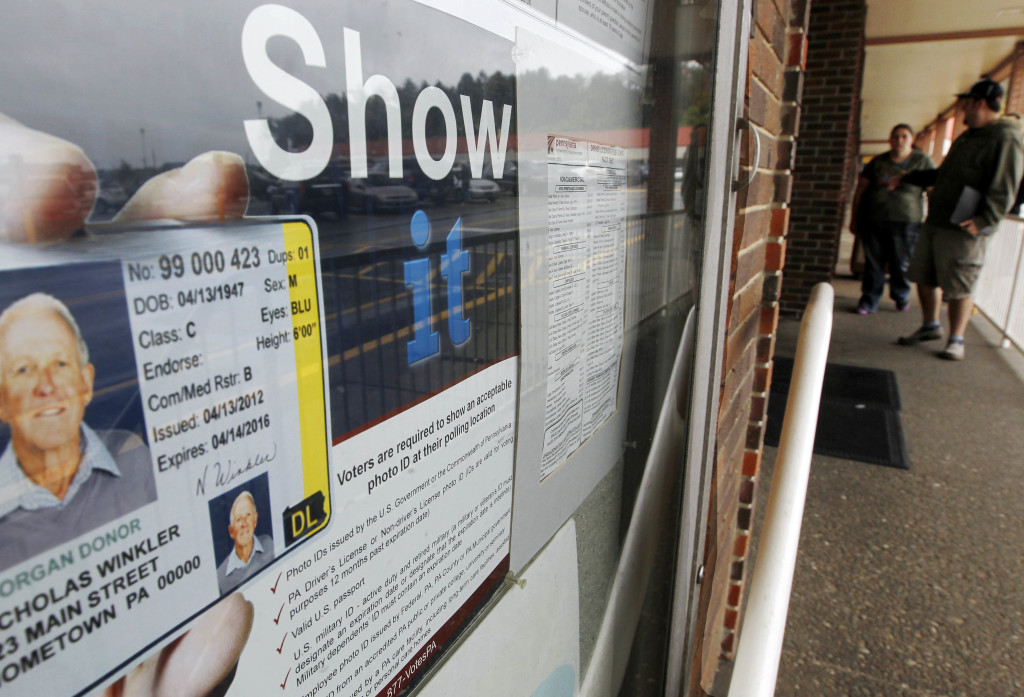Pennsylvania Voter ID Law Blocked for Nov. Election

October 2, 2012
Share
A judge said today that Pennsylvania’s new voter ID law cannot take effect until after the Nov. 6 presidential election, meaning that voters in this swing state won’t yet have to show ID at the polls.
In his ruling, Judge Robert Simpson said that the state had improved the system to issue voter IDs, but that there wasn’t enough time to ensure everyone would have an ID in time for November’s election. You can read the full decision here (pdf). The case could still be appealed to the state Supreme Court, but it’s unlikely that the decision would change before Nov. 6.
Pennsylvania passed a law in March requiring voters to produce a government-issued photo ID card to vote. It’s one of 16 states that have passed some kind of restrictive voter laws since last year, ostensibly to prevent the rare occurrence of voter fraud.
Some of these laws have been overturned. In August, a three-judge panel struck down Texas’ voter ID law, saying it would discriminate against poor minority voters. A ban on early-voting in some Florida counties was also overruled by a judge, who said the ban discriminates against blacks.
A decision on a voter ID law in South Carolina is expected in early October, although the judges have wondered aloud whether it might make more sense to hold off on implementing the law until after the November election.
The Pennsylvania law has received particular scrutiny in part because it’s an important swing state with 20 electoral votes. But it’s also the only state where an official has admitted to a partisan motive. In June, Mike Turzai, the Pennsylvania House majority leader, said that the law was intended to allow former Massachusetts Gov. Mitt Romney to win the presidential election. Turzai’s spokesman, Steve Miskin, later said that the law was really about preventing voter fraud.
But state officials later admitted in court [pdf] that they had no evidence of voter fraud in the past, and didn’t expect it to happen in this election. They argued, however, that voters who didn’t have proper ID could obtain a free ID from the state, making an easily surmountable hurdle to the polls.
As the weeks passed, Pennsylvania’s Department of State, which is required to implement the law, made at least five changes to the requirements for obtaining an identification. For example:
- In April, it said that voters with expired driver’s licenses or non-driver’s photo ID but who were still in the state’s database, didn’t need to present the documents required — a birth certificate, Social Security card or two proofs of residency — to get their free ID.
- In May, voters born in the state didn’t have to pay to obtain their birth certificates to get an ID.
- In July, the department announced that voters would be able to obtain a different ID for voting only, with a lower burden of proof, in late August.
- By Aug. 27, that new ID, issued by the Pennsylvania Department of State, was made available to certain voters in one trip to the Department of Transportation, but others still had to make two trips to complete the necessary paperwork.
- In September, the department broadened the rules to allow voters to apply in a single trip.
“What the law said and how they planned to implement it in March is very different compared to how they’re implementing it today,” said Ellen Kaplan, vice president and policy director of the Committee of Seventy, a Philadelphia-based nonpartisan watchdog group. The committee has been critical of the law because it says it creates unnecessary barriers to voting.
The Pennsylvania Supreme Court in September sent the law back to the Commonwealth Court to decide whether the state was making it too difficult for people to obtain the new ID.
“We think [today’s ruling is] a great victory for Pennsylvania voters, because no one will be turned away from the polls,” said Sara Mullen, associate director of the American Civil Liberties Union in Pennsylvania, which brought the case.
Pennsylvania’s Department of State didn’t immediately respond to a phone call seeking a comment.
[Update: 3:15 p.m.:] In a statement released Tuesday afternoon, Governor Tom Corbett said: “While we believe we have made it possible for every registered voter who needs voter identification to obtain one, we’ll continue our efforts for the next election and all future elections, to make sure every registered voter has the proper identification in an effort to preserve the integrity of our voting process in Pennsylvania.”
The ACLU still says the law itself is discriminatory: It plans to pursue its case after the November election.

Latest Documentaries
Explore
Policies
Teacher Center
Funding for FRONTLINE is provided through the support of PBS viewers and by the Corporation for Public Broadcasting, with major support from Ford Foundation. Additional funding is provided the Abrams Foundation, Park Foundation, John D. and Catherine T. MacArthur Foundation, Heising-Simons Foundation, and the FRONTLINE Trust, with major support from Jon and Jo Ann Hagler on behalf of the Jon L. Hagler Foundation, and additional support from Koo and Patricia Yuen. FRONTLINE is a registered trademark of WGBH Educational Foundation. Web Site Copyright ©1995-2025 WGBH Educational Foundation. PBS is a 501(c)(3) not-for-profit organization.



















